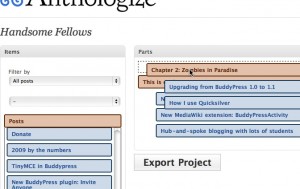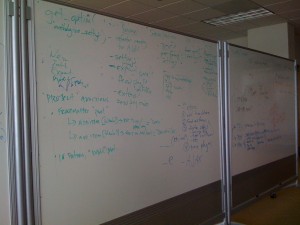This year I attended my third THATCamp (at CHNM, anyway – I’ve been to a few others around the country). The first time I went, in 2009, I’d just started working with Matt Gold on the CUNY Academic Commons. I didn’t know many people in the digital humanities community. I was a graduate student in philosophy, accustomed to conferences that were philosophy-ish and graduate-student-esque. THATCamp stood in stark contrast to this background, and as a result was very new and exciting. An event where academics would get together to talk about things that were actually interesting, independently motivated, and new – the very idea of it! I couldn’t help but feel intoxicated by it all.
Fast forward two years. I’m no longer a graduate student. I’m no longer a full-time employee of a university. I’m no longer a stranger to digital humanities and the DH community. And I’m no longer a n00b. Unsurprisingly, this perspective changes the way I experience THATCamp.
For one thing, the “more hack, less yak” theme which prevails at THATCamp does not have revelatory ring it once had. I build stuff for a living. All I ever do is hack. As a result, I actually look forward to the occasional yak. I recognize that the “less yak” mantra arises out of frustration about the futility of “mere” talk, and represents a railing against the tendency of academic activity to consist of little more than such talk. In this sense, I should probably be grateful that I’m no longer in a career where I feel trapped under a pile of words. And, in fact, I do feel pretty happy about it, especially after all these years. But my recent career changes do mean that I don’t get the same gee-whiz-I’m-so-excited-we’re-actually-doing-something rush out of THATCamp that many others (justifiably) do.
On a related note, I’m less excited about geekery these days than I was before I was a professional geek. (I’m being intentionally narrow in my use of the word ‘geek’ to mean ‘someone who codes’. The word isn’t particularly important; swap it out for ‘coder’ if you want.) THATCamp can be like a dude ranch. The city slickers come to the country for the weekend, ride a horse, throw a lasso, eat some beans-n-bacon, and say “Gee, isn’t the country life great?” What the dudes don’t realize is that being a rancher means doing stuff like shoveling a lot of cow shit. In the same way, coming to THATCamp and learning a bit about Greasemonkey scripts or the Google Maps API or WordPress themes can be a rush – after all, those things are all really cool. But it’s also a kind of cartoonish picture of what it’s like to write code all day long, which is really more about shoveling the cow shit of bug tickets than about whizbang jQuery effects and singing campfire tunes.
Of course, I’m under no illusion that THATCamp sessions are meant to be introductions to the Real Cowboy Life, and I’m certain that the attendees of such sessions aren’t under any such illusions either. And I should be clear that I don’t want to be a spoilsport. For the most part, I think it’s genuinely good for people to learn how to write code (where writing code should be understood as standing in for a whole bunch of related phenomena). For one thing, it’s undoubtably good for people to engage critically with the tools that mediate so much of our lives. Moreover, people like Patrick Murray-John have been making some interesting, if tentative, arguments for the ways in which the modes of thinking exemplified by coding might interesect with, and augment, the modes typified by traditional academic work. Plus, learning to code is just plain fun. So it’s great that people who wouldn’t otherwise have the chance to learn something about code have THATCamp as an outlet. I’m just no longer one of those people, I guess.
I also would probably enjoy THATCamp more if I broke outside of my own comfort zone. During this year’s event, I skipped a couple sessions to write Anthologize code with a few members of the One Week | One Tool gang. It was a blast, and a great way to spend time with some friends who are otherwise scattered throughout the country. Yet, I might have gotten more out of the event if I’d attended more sessions, especially sessions whose subjects were a bit outside of my normal area of specialization. But at an event like THATCamp Prime, which has the usual round-up of DH A-listers talking about tried-and-true topics, it becomes increasingly difficult to find those truly new conversations.
I don’t really mean these observations to be wholesale critiques of the THATCamp setup. Many of the reactions that I saw to this year’s event – blog posts, tweets, personal conversations, and the excited looks on people’s faces – suggested that the newcomers felt the same sense of giddiness that characterized my own first THATCamp experience. But I do think it’s interesting how my giddiness (or lack thereof) is so hugely shaped by changes in my own standing over the years. Maybe next year I’ll make more of a concentrated effort to carve out a spot at THATCamp for folks with my particular set of interests and strengths.


